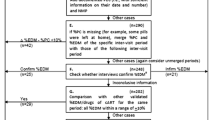Abstract
The Medication Event Monitoring System (MEMS) is a relatively new device designed to overcome some of the disadvantages of traditional adherence-measuring techniques. MEMS has also been found useful in tracking adherence behaviour without the need to visit patients frequently. In this study each patient was given a pre-filled, labelled MEMS bottle and cap. Patients were monitored for 24 weeks. For patients specifically studied, there were periods when drug levels may have been low and some exhibited erratic medication-taking behaviour. It is concluded that MEMS can measure adherence behaviour objectively, and so might be used to improve prescribing decisions, identify drug wastage and improve carer support. Further research is needed before the routine use of electronic medication monitoring can be recommended.
Similar content being viewed by others
References and Notes
Office of Health Economics (1995).Compendium of Health Statistics (9th edn), London.
Anon (1991). Helping patients to make the best use of medicines.Drugs & Therapeutics Bulletin 29(1), 1–2.
Rudd, P., Ahmed, S., Zachary, V., Barton, C. and Donduelle, D. (1992). Issues in patient adherence: the search for therapeutic sufficiency.Cardiology 80(suppl 1), 2–10.
Pearson, R.M. (1982). Who is taking their tablets?British Medical Journal 285, 757–758.
Cramer, J.A., Mattson, M.D., Prevey, M.L., Scheyear, M.D., Valinda, L. and Ouellette, R.N. (1989). How often is medication taken as prescribed? A novel assessment technique.Journal of the American Medical Association 261, 3273–3277.
Rudd, P., Richard, L., Byyny, R.L., Zachary, V., LoVerde, M.E., Titus, C., Mitchell, W.D. and Marshall, G. (1989). The natural history of medication compliance in a drug trial: limitations of pill counts.Clinical Pharmacology & Therapeutics 46(2), 169–176.
Lancet Editorial (1993). Patient compliance in therapeutic trials.Lancet 337, 823–824.
McGavock, H. (1996).A Review of the Literature on Drug Adherence. A review commissioned as part of a project on adherence entitledPartnership in Medicine Taking supported jointly by The Royal Pharmaceutical Society of Great Britain and Merck Sharp & Dohme Ltd.
Pullar, T. and Feely, M.F. (1990). Problems of adherence with drug treatment: new solutions?Pharmaceutical Journal 245, 213–215.
Matsuyama, J.R., Mason, B.J. and Jue, S.G. (1993). Pharmacists’ interventions using an electronic medication-event monitoring device’s adherence data versus pill counts.Annals of Pharmacotherapy 27, 851–855.
Rudd, P., Ahmed, S., Zachary, V., Barton, C. and Bonduelle, D. (1990). Improved adherence measures: applications in an ambulatory hypertensive drug trial.Clinical Pharmacology and Therapeutics 48(6), 676–685.
MEMS (4) is supplied by Aprex Ltd, Bundessrasse 3, CH-6304 Zug, Switzerland
Statistical Package for Social Sciences (1994).SPSS for Windows Release 6.1, Chicago.
Goldstein, R., Rivers, P. and Close, P. (1993). Good quality pharmaceutical care—implications for carers.International Journal of Pharmacy Practice 2(2), 65–70.
Goldstein, R., Rivers, P. and Close, P. (1993). Assisting elderly people with their medication—the role of home carers.Health Trends 25(4), 135–139.
Goldstein, R. and Rivers, P. (1996). The medication role of informal carers.Health and Social Care in the Community 4(3), 150–158.
Exact CM Compliance Monitoring System is supplied by Anderson Clinical Technologies, 4120, Winnetka Avenue, Rolling Meadows, IL 60008, USA.
Author information
Authors and Affiliations
Rights and permissions
About this article
Cite this article
Rivers, P.H., Ardagh-Walter, N. & Wright, E.C. Measurement of anticonvulsant adherence behaviour in the community using a medication events monitoring system (MEMS). Health Care Anal 6, 308–316 (1998). https://doi.org/10.1007/BF02678367
Issue Date:
DOI: https://doi.org/10.1007/BF02678367




